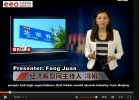

June 19, 2013
Translated by Zhu Na
Plans to expand a property tax that is already being levied in Shanghai and Chongqing to Beijing, Shenzhen, Nanjing and Hangzhou, have already been submitted to the State Council, according to a report in today's China Securities Journal (中国证券报).
The report says that recent increases in housing prices have put pressure on some cities to adopt the controversial tax.
Pilot schemes that will levy a tax on the owners of certain residential properties have already been submitted to the State Council for approval, according to what an unnamed source told the newspaper.
The specific details of each city's plan is said to already be close to a "final version" (最终版本).
The newspaper says that the expansion of the number of cities trialling the new property tax might take place soon.
China Securities Journal ran a similar report in May and other media outlets have also published articles suggesting that the expansion of the property tax will take place soon.
Tax authorities in Beijing have repeatedly denied that there are plans to introduce a property tax trial in the capital.
Rising Housing Prices
Last month, the price of newly-built commercial residential properties increased on a year-on-year basis in 69 of the 70 medium and large cities monitored by the National Bureau of Statistics (NBS).
China's four largest cities led the way, with housing prices in Guangzhou up 15.5 percent while Beijing saw the cost of housing increase by 15.2 percent year-on-year in May. Housing prices in Shenzhen and Shanghai increased by 14 percent and 12.2 percent respectively.
Although the overall number of cities that saw prices rise on a month-on-month basis decreased last month, still 65 of the 70 cities surveyed registered monthly increases in May.
Analysts argue that recent moves to further tighten property purchase restrictions helped to cool the market and led to fewer cities experiencing month-on-month price rises in May.
However, others say that the demand for housing in first-tier cities is well in excess of supply and the new policies are not enough to reverse market expectations of rising prices over the longterm.
Liu Jianwei (刘建伟), a senior statistician with the NBS, said that there are still too many cities experiencing rising housing prices and authorities need to continue to effectively implement real estate market regulation and controls.
A number of market players said that the effectiveness of the current restrictions is weakening. A number of experts suggested that the restrictions should be adjusted in order to better balance the market.
The China Securities Journal article ended by saying that the expansion of the property tax pilot could be one mechanism to help effectively regulate the housing market over the long term.
A Short History of China's Property Tax
The property tax trial began in January 2011 when Chongqing and Shanghai both announced they would introduce a property tax.
According to the Chongqing rules, which were revised in Oct 2011, free-standing commerical residential properties (villas), newly-purchased up-market properties and second (or additional) residential properties owned by people who do not work, run a business or have their hukou registered in Chongqing, are all subject to the property tax. The regulations only apply to properties within the nine main urban districts of the western metropolis. The tax is levied at a rate of either 0.5 percent, 1 percen他or 1.2 percent respectively, according to the amount paid for the property.
In Shanghai, new homes costing more than 27,740 yuan a square meter get are taxed at a rate of 0.6 percent. The tax on both new and existing homes is 0.4 percent if the value of the property is less than 27,740 yuan a square meter. Locals who purchase a house with a floor space of less than 60 square meters per head are exempt from the tax.
Links and Sources
China Securities Journal: 京深等地房产税试点方案已上报
Economic Observer Online: Property Tax Expansion Back on Agenda
Economic Observer Online: Controversy Over Property Tax Expansion
Economic Observer Online: Beijing Eyes Introduction of Property Tax
